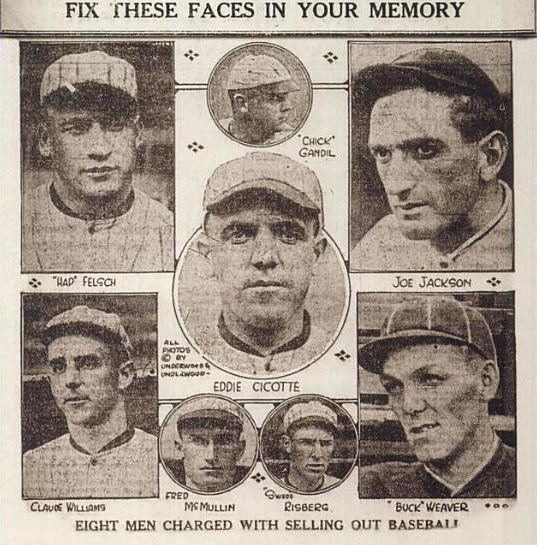September 28, 1920: With the Chicago White Sox, the Cleveland Indians, and the New York Yankees in a 3-way dogfight for the American League Pennant, 7 Chicago players are indicted for conspiracy to "throw" the previous year's World Series.
They are: Left fielder "Shoeless" Joe Jackson, pitchers Eddie Cicotte and Claude "Lefty" Williams, 1st baseman Arnold "Chick" Gandil, shortstop Charles "Swede" Risberg, center fielder Oscar "Happy" Felsch, and reserve infielder Fred McMullin. With Gandil, it didn't matter: He had already retired.
Also indicted was 3rd baseman George "Buck" Weaver, who refused to take part in the fix, but was indicted because he knew about it and refused to report it.
On July 28, 1921, a Chicago jury acquitted the 8 players of conspiracy to defraud, because there wasn't enough evidence for a conviction. But on August 2, Kenesaw Mountain Landis, a Chicago-based former federal Judge who had been appointed Commissioner of Baseball by the team owners to help re-establish the sport's credibility, banned them all permanently.
Without the 7 remaining players, the White Sox could not win the Pennant. The Indians did. The White Sox didn't win another Pennant until 1959, and another World Series until 2005.
For the rest of their lives, The members of the 1919 Cincinnati Reds insisted that, if the Series had been on the up-and-up, they would have won anyway.
Really? Here's something else to consider: Down 4 games to 1 in that best-5-out-of-9, the Sox won Games 6 and 7, playing to win because the gamblers hadn't come through with their payments, and Williams only caved in for Game 8 because his family had been threatened if he did not comply. Williams was 0-3 for the Series, a record not "achieved" honestly until 1981 and George Frazier of the Yankees.
It's been said that Babe Ruth and his home runs "saved baseball after the Black Sox Scandal." This is ridiculous. Ruth was hitting home runs like crazy all season long in 1920, and attendance remained higher throughout the "Roaring Twenties" than it was in the years before America entered World War I. Babe's homers didn't save baseball after the scandal, but they may have helped cover it up.
What happened to the 8 banned players?
* Fred McMullin, ironically, went into law enforcement, being named a Deputy Marshal in Los Angeles County in California in 1940. But high blood pressure led to a fatal stroke in 1952, at age 61.
* Buck Weaver remained in Chicago, and continued to press his case for reinstatement, not because he felt the need to play again, but because he wanted his name officially cleared, not just by the court (as it had already been), but by baseball itself. He died of a heart attack in 1956, at 65. His family continues to appeal on his behalf, so far without success.
* Lefty Williams played in outlaw leagues, outside Landis' jurisdiction, then operated a garden nursery business outside Los Angeles. He died from the effects of years of heavy drinking, at 66, in 1959, 40 years after the Series in question, and the year the White Sox finally won their next Pennant.
* Happy Felsch played semi-pro ball in the west of America and Canada for another 15 years, before returning to his native Milwaukee, opening a grocery store and a series of bars. Apparently, he sampled his own product more than he should, because it died of liver failure, in 1964, shortly before turning 73.
* Eddie Cicotte returned to Michigan, managed a service station, served as a game warden, worked for Ford Motor Company, and ran a farm outside Detroit. He died in 1969, at 84.
* Chick Gandil had little to lose: He had already decided to leave organized ball, and returned to California, where he played semi-pro ball on a team with Jackson, Risberg, McMullin, and another player banned due to his connection to the scandal, Joe Gedeon of the St. Louis Browns. In 1925, he played in Arizona with some banned players, including Hal Chase, a former Yankee 1st baseman known for great fielding but also for throwing games.
Gandil gave an interview to Sports Illustrated in 1956, admitting to being the scandal's ringleader, expressing regret for it, but agreeing that he and the others deserved to be banned. He died of heart trouble in 1970, at 82.
* Swede Risberg also played semi-pro baseball, including in 1922 in Minnesota on a team with Felsch and Williams. He returned to his native Northern California, worked on a dairy farm, and later ran a tavern and a lumber business. He was the last survivor, dying on his 81st birthday, October 13, 1975.
*
September 28, 1920 was a Tuesday. The NFL had just been founded, and hadn't started play yet. The NHL was new, and its season then began in December. The NBA wouldn't be founded for another 26 years. But there were 5 Major League Baseball games played that day:
* A doubleheader was split at Fenway Park in Boston. The Boston Red Sox won the opener, 5-3. The Washington Senators won the nightcap, 7-6.
* The defending World Champion Cincinnati Reds swept a doubleheader with the Pittsburgh Pirates at Redland Field in Cincinnati. (It was renamed Crosley Field in 1935.) The Reds won the 1st game 2-0, on a shutout by Hod Eller. They won the 2nd game 5-3.
* And the Cleveland Indians beat the St. Louis Browns, 9-5 at Sportsman's Park in St. Louis. The Indians went on to win the World Series.
